英语文学翻译训练
- 格式:doc
- 大小:32.00 KB
- 文档页数:2
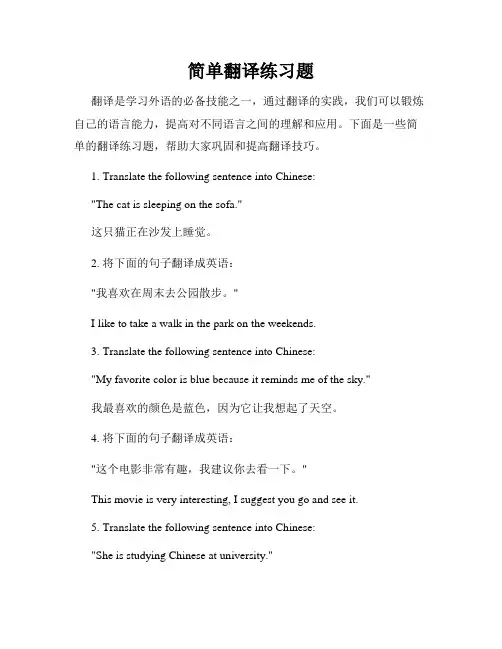
简单翻译练习题翻译是学习外语的必备技能之一,通过翻译的实践,我们可以锻炼自己的语言能力,提高对不同语言之间的理解和应用。
下面是一些简单的翻译练习题,帮助大家巩固和提高翻译技巧。
1. Translate the following sentence into Chinese:"The cat is sleeping on the sofa."这只猫正在沙发上睡觉。
2. 将下面的句子翻译成英语:"我喜欢在周末去公园散步。
"I like to take a walk in the park on the weekends.3. Translate the following sentence into Chinese:"My favorite color is blue because it reminds me of the sky."我最喜欢的颜色是蓝色,因为它让我想起了天空。
4. 将下面的句子翻译成英语:"这个电影非常有趣,我建议你去看一下。
"This movie is very interesting, I suggest you go and see it.5. Translate the following sentence into Chinese:"She is studying Chinese at university."她正在大学学习中文。
6. 将下面的句子翻译成英语:"我在周末通常和朋友们一起打篮球。
"I usually play basketball with my friends on the weekends.7. Translate the following sentence into Chinese:"Could you please pass me the salt?"请把盐递给我好吗?8. 将下面的句子翻译成英语:"那个建筑物非常古老,已经有几百年的历史了。
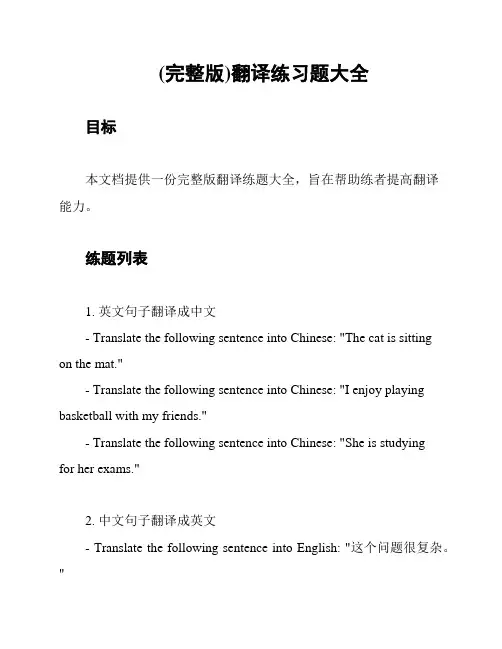
(完整版)翻译练习题大全目标本文档提供一份完整版翻译练题大全,旨在帮助练者提高翻译能力。
练题列表1. 英文句子翻译成中文- Translate the following sentence into Chinese: "The cat is sittingon the mat."- Translate the following sentence into Chinese: "I enjoy playing basketball with my friends."- Translate the following sentence into Chinese: "She is studyingfor her exams."2. 中文句子翻译成英文- Translate the following sentence into English: "这个问题很复杂。
"- Translate the following sentence into English: "我正在研究英语。
"- Translate the following sentence into English: "他们明天要去旅游。
"3. 短文翻译- Translate the following short passage into Chinese:"John and Mary are brother and sister. They live in a small house near the beach. Every summer, they go swimming in the ocean and build sandcastles on the sand. They have a lot of fun together."- Translate the following short passage into English:"李华是一个勤奋的学生。
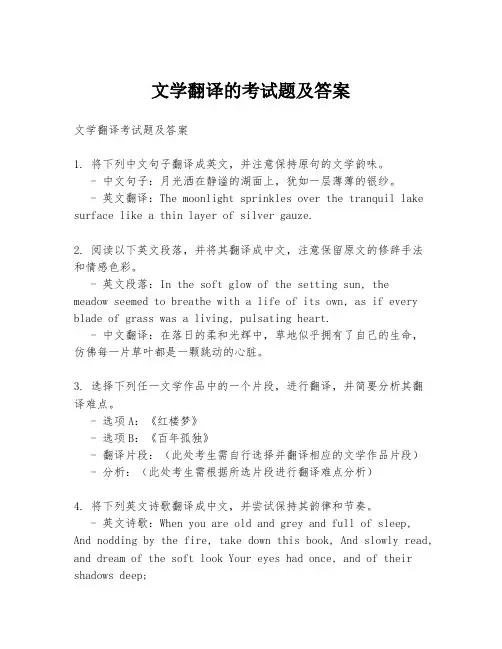
文学翻译的考试题及答案文学翻译考试题及答案1. 将下列中文句子翻译成英文,并注意保持原句的文学韵味。
- 中文句子:月光洒在静谧的湖面上,犹如一层薄薄的银纱。
- 英文翻译:The moonlight sprinkles over the tranquil lake surface like a thin layer of silver gauze.2. 阅读以下英文段落,并将其翻译成中文,注意保留原文的修辞手法和情感色彩。
- 英文段落:In the soft glow of the setting sun, the meadow seemed to breathe with a life of its own, as if every blade of grass was a living, pulsating heart.- 中文翻译:在落日的柔和光辉中,草地似乎拥有了自己的生命,仿佛每一片草叶都是一颗跳动的心脏。
3. 选择下列任一文学作品中的一个片段,进行翻译,并简要分析其翻译难点。
- 选项A:《红楼梦》- 选项B:《百年孤独》- 翻译片段:(此处考生需自行选择并翻译相应的文学作品片段)- 分析:(此处考生需根据所选片段进行翻译难点分析)4. 将下列英文诗歌翻译成中文,并尝试保持其韵律和节奏。
- 英文诗歌:When you are old and grey and full of sleep, And nodding by the fire, take down this book, And slowly read, and dream of the soft look Your eyes had once, and of their shadows deep;- 中文翻译:当你老了,头发花白,睡意沉沉,倦坐在炉边,取下这本书,慢慢读,梦想你眼中曾有的柔情,和那深深的影子;5. 评析以下中文翻译片段的质量,并提出改进建议。
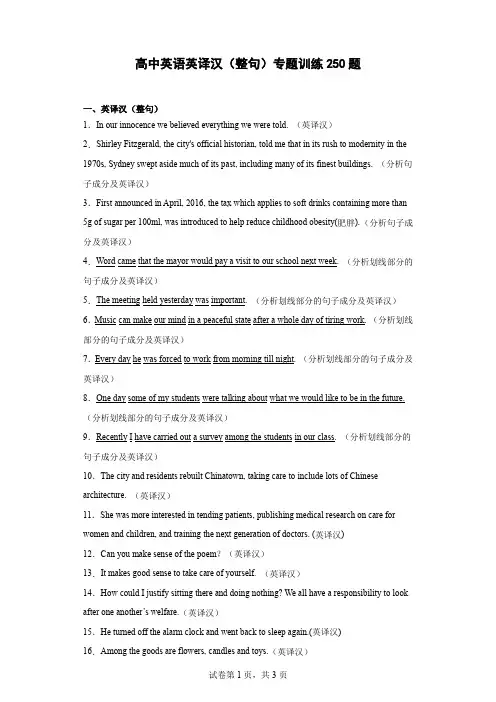
高中英语英译汉(整句)专题训练250题一、英译汉(整句)1.In our innocence we believed everything we were told. (英译汉)2.Shirley Fitzgerald, the city's official historian, told me that in its rush to modernity in the 1970s, Sydney swept aside much of its past, including many of its finest buildings. (分析句子成分及英译汉)3.First announced in April, 2016, the tax which applies to soft drinks containing more than 5g of sugar per 100ml, was introduced to help reduce childhood obesity(肥胖). (分析句子成分及英译汉)4.Word came that the mayor would pay a visit to our school next week. (分析划线部分的句子成分及英译汉)5.The meeting held yesterday was important. (分析划线部分的句子成分及英译汉)6.Music can make our mind in a peaceful state after a whole day of tiring work. (分析划线部分的句子成分及英译汉)7.Every day he was forced to work from morning till night. (分析划线部分的句子成分及英译汉)8.One day some of my students were talking about what we would like to be in the future. (分析划线部分的句子成分及英译汉)9.Recently I have carried out a survey among the students in our class. (分析划线部分的句子成分及英译汉)10.The city and residents rebuilt Chinatown, taking care to include lots of Chinese architecture. (英译汉)11.She was more interested in tending patients, publishing medical research on care for women and children, and training the next generation of doctors. (英译汉)12.Can you make sense of the poem?(英译汉)13.It makes good sense to take care of yourself. (英译汉)14.How could I justify sitting there and doing nothing? We all have a responsibility to look after one another’s welfare.(英译汉)15.He turned off the alarm clock and went back to sleep again.(英译汉)16.Among the goods are flowers, candles and toys.(英译汉)17.Standing on the top of the mountain is an ancient towns.(汉译英)18.If you keep your eyes open ,you will be surprised to find that you can see both its past and its present. (英译汉)19.Confucius said that learning without thinking leads to confusion. (英译汉)20.One of the greatest benefits of the Internet is its ability to remove the distance that usually exists between people. (英译汉)21.The UK is a fascinating mix of historic and modern culture, with both new and old traditions.(英译汉)22.Encouraged by this first performance and the positive reaction of the audience, I have continued to play the piano. (英译汉)23.Those living legends set good examples for us to bring honour and glory to our countries.(英译汉)24.A committee was established to prevent the loss of cultural relics and ask for contributions from different countries. (英译汉)25.Adam’s mental strength encourages us to face any challenge in senior high school bravely. (英译汉)26.你应该早做而不是晚做。
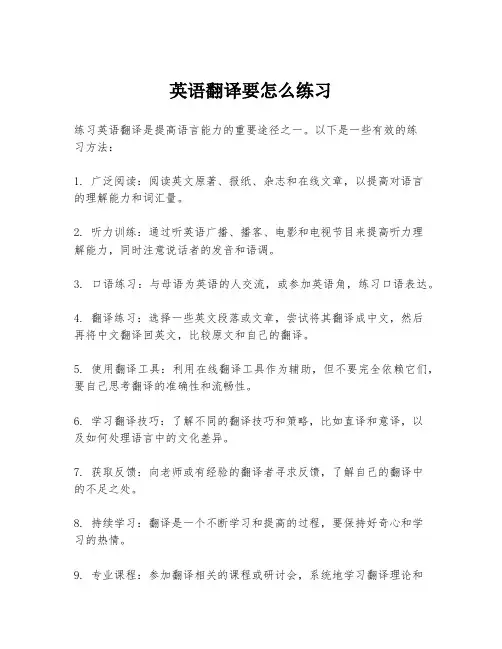
英语翻译要怎么练习
练习英语翻译是提高语言能力的重要途径之一。
以下是一些有效的练
习方法:
1. 广泛阅读:阅读英文原著、报纸、杂志和在线文章,以提高对语言
的理解能力和词汇量。
2. 听力训练:通过听英语广播、播客、电影和电视节目来提高听力理
解能力,同时注意说话者的发音和语调。
3. 口语练习:与母语为英语的人交流,或参加英语角,练习口语表达。
4. 翻译练习:选择一些英文段落或文章,尝试将其翻译成中文,然后
再将中文翻译回英文,比较原文和自己的翻译。
5. 使用翻译工具:利用在线翻译工具作为辅助,但不要完全依赖它们,要自己思考翻译的准确性和流畅性。
6. 学习翻译技巧:了解不同的翻译技巧和策略,比如直译和意译,以
及如何处理语言中的文化差异。
7. 获取反馈:向老师或有经验的翻译者寻求反馈,了解自己的翻译中
的不足之处。
8. 持续学习:翻译是一个不断学习和提高的过程,要保持好奇心和学
习的热情。
9. 专业课程:参加翻译相关的课程或研讨会,系统地学习翻译理论和
实践。
10. 实践多样化文本:翻译不同类型的文本,如文学作品、科技文章、法律文件等,以提高适应不同文本类型的翻译能力。
通过这些方法的持续练习,可以逐步提高英语翻译的技能。
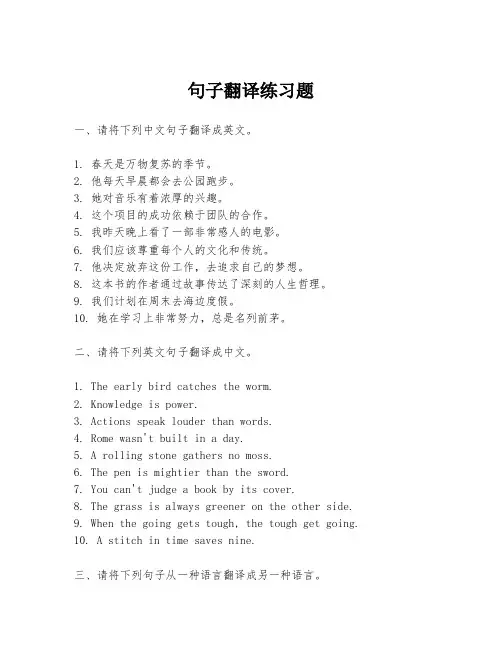
句子翻译练习题一、请将下列中文句子翻译成英文。
1. 春天是万物复苏的季节。
2. 他每天早晨都会去公园跑步。
3. 她对音乐有着浓厚的兴趣。
4. 这个项目的成功依赖于团队的合作。
5. 我昨天晚上看了一部非常感人的电影。
6. 我们应该尊重每个人的文化和传统。
7. 他决定放弃这份工作,去追求自己的梦想。
8. 这本书的作者通过故事传达了深刻的人生哲理。
9. 我们计划在周末去海边度假。
10. 她在学习上非常努力,总是名列前茅。
二、请将下列英文句子翻译成中文。
1. The early bird catches the worm.2. Knowledge is power.3. Actions speak louder than words.4. Rome wasn't built in a day.5. A rolling stone gathers no moss.6. The pen is mightier than the sword.7. You can't judge a book by its cover.8. The grass is always greener on the other side.9. When the going gets tough, the tough get going.10. A stitch in time saves nine.三、请将下列句子从一种语言翻译成另一种语言。
1. 学习新语言可以开阔视野。
(中文翻译成英文)2. We should always look on the bright side of life.(英文翻译成中文)3. 保持积极的态度是成功的关键。
(中文翻译成英文)4. Honesty is the best policy.(英文翻译成中文)5. 健康是人生最大的财富。
(中文翻译成英文)6. To be or not to be, that is the question.(英文翻译成中文)7. 每个人都有自己的梦想。

英语短文翻译练习In the realm of linguistics, translation is not merely a mechanical process of converting words from one language to another. It is an art that requires a deep understanding of both the source and target languages, as well as the cultural contexts in which they are used. This is why translation exercises are an essential part of language learning, as they help to develop the skills necessary to convey meaning accurately and effectively.When practicing English translation, one should focus on several key aspects:1. Comprehension: Understand the context and the meaning of the original text in the source language.2. Vocabulary: Ensure that one has a robust vocabulary in both languages to express ideas clearly.3. Grammar: Master the grammar rules of the target language to construct sentences that are grammatically correct.4. Cultural Nuances: Be aware of cultural differences that may affect the translation, such as idiomatic expressions or references that may not have direct equivalents in the target language.5. Style and Tone: Maintain the style and tone of theoriginal text, which can be as important as the literal meaning.6. Revision: Always revise the translation to ensure that it reads naturally and conveys the intended message withoutlosing any of the original text's nuances.By engaging in regular translation practice, one can improve not only their language proficiency but also their ability to think critically and creatively when faced with the challenges of language conversion. It is through such exercises that one can truly become a master of the art of translation.。
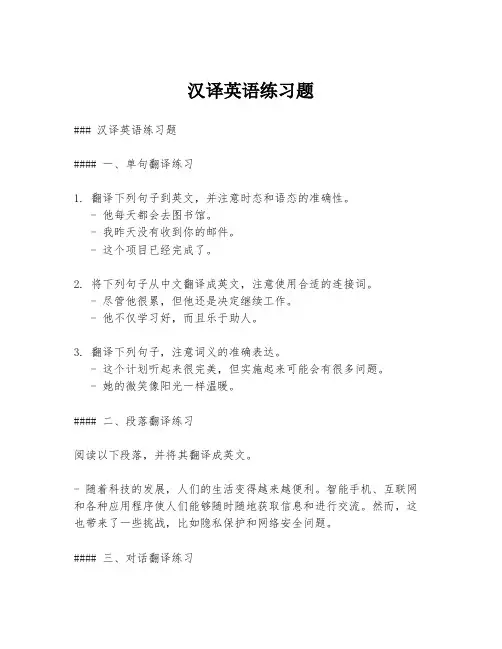
汉译英语练习题### 汉译英语练习题#### 一、单句翻译练习1. 翻译下列句子到英文,并注意时态和语态的准确性。
- 他每天都会去图书馆。
- 我昨天没有收到你的邮件。
- 这个项目已经完成了。
2. 将下列句子从中文翻译成英文,注意使用合适的连接词。
- 尽管他很累,但他还是决定继续工作。
- 他不仅学习好,而且乐于助人。
3. 翻译下列句子,注意词义的准确表达。
- 这个计划听起来很完美,但实施起来可能会有很多问题。
- 她的微笑像阳光一样温暖。
#### 二、段落翻译练习阅读以下段落,并将其翻译成英文。
- 随着科技的发展,人们的生活变得越来越便利。
智能手机、互联网和各种应用程序使人们能够随时随地获取信息和进行交流。
然而,这也带来了一些挑战,比如隐私保护和网络安全问题。
#### 三、对话翻译练习将下列对话翻译成英文。
- A: 你最近怎么样?B: 我很好,谢谢。
你呢?A: 我也不错。
你周末有什么计划吗?B: 我打算去爬山。
你呢?A: 我可能会去图书馆看书。
#### 四、翻译技巧点拨- 注意中英文表达习惯的差异。
- 避免逐字翻译,要理解句子的整体意思。
- 选择正确的词汇,注意词汇的语境和色彩。
#### 五、翻译练习答案1. He goes to the library every day.- I did not receive your email yesterday.- The project has been completed.2. Despite his fatigue, he decided to continue working.- He is not only a good student but also very helpful.3. This plan sounds perfect, but there may be many problems when it comes to implementation.- Her smile is as warm as sunshine.段落翻译参考:- With the development of technology, people's lives are becoming more and more convenient. Smartphones, the internet, and various applications allow people to access informationand communicate anytime, anywhere. However, this also brings some challenges, such as privacy protection and network security issues.对话翻译参考:- A: How have you been lately?B: I'm doing well, thanks. How about you?A: I'm also doing well. Do you have any plans for the weekend?B: I plan to go hiking. How about you?A: I might go to the library to read.通过这些练习,可以提高你的汉译英能力,同时也能够加深你对语言差异和翻译技巧的理解。
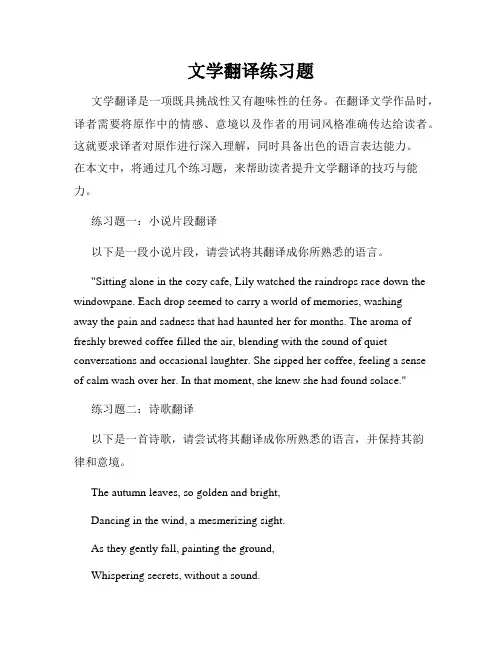
文学翻译练习题文学翻译是一项既具挑战性又有趣味性的任务。
在翻译文学作品时,译者需要将原作中的情感、意境以及作者的用词风格准确传达给读者。
这就要求译者对原作进行深入理解,同时具备出色的语言表达能力。
在本文中,将通过几个练习题,来帮助读者提升文学翻译的技巧与能力。
练习题一:小说片段翻译以下是一段小说片段,请尝试将其翻译成你所熟悉的语言。
"Sitting alone in the cozy cafe, Lily watched the raindrops race down the windowpane. Each drop seemed to carry a world of memories, washingaway the pain and sadness that had haunted her for months. The aroma of freshly brewed coffee filled the air, blending with the sound of quiet conversations and occasional laughter. She sipped her coffee, feeling a sense of calm wash over her. In that moment, she knew she had found solace."练习题二:诗歌翻译以下是一首诗歌,请尝试将其翻译成你所熟悉的语言,并保持其韵律和意境。
The autumn leaves, so golden and bright,Dancing in the wind, a mesmerizing sight.As they gently fall, painting the ground,Whispering secrets, without a sound.练习题三:戏剧对白翻译以下是一段戏剧对白,请尝试将其翻译成你所熟悉的语言,并准确传达角色之间的情感和台词的意义。
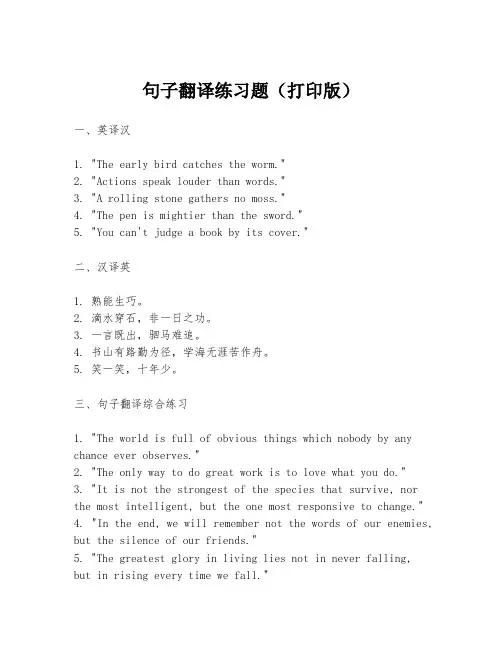
句子翻译练习题(打印版)一、英译汉1. "The early bird catches the worm."2. "Actions speak louder than words."3. "A rolling stone gathers no moss."4. "The pen is mightier than the sword."5. "You can't judge a book by its cover."二、汉译英1. 熟能生巧。
2. 滴水穿石,非一日之功。
3. 一言既出,驷马难追。
4. 书山有路勤为径,学海无涯苦作舟。
5. 笑一笑,十年少。
三、句子翻译综合练习1. "The world is full of obvious things which nobody by any chance ever observes."2. "The only way to do great work is to love what you do."3. "It is not the strongest of the species that survive, nor the most intelligent, but the one most responsive to change."4. "In the end, we will remember not the words of our enemies, but the silence of our friends."5. "The greatest glory in living lies not in never falling,but in rising every time we fall."四、成语翻译1. 画蛇添足2. 亡羊补牢3. 掩耳盗铃4. 杯弓蛇影5. 井底之蛙五、段落翻译英译汉"In a world where you can be anything, be kind. It's a simple act, yet it can change someone's day for the better. Kindness is a language that the deaf can hear and the blind can see."汉译英"在这个世界上,你可以成为任何人。
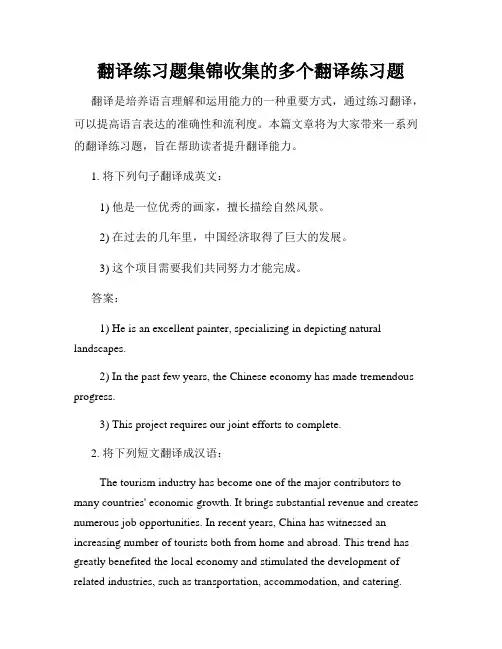
翻译练习题集锦收集的多个翻译练习题翻译是培养语言理解和运用能力的一种重要方式,通过练习翻译,可以提高语言表达的准确性和流利度。
本篇文章将为大家带来一系列的翻译练习题,旨在帮助读者提升翻译能力。
1. 将下列句子翻译成英文:1) 他是一位优秀的画家,擅长描绘自然风景。
2) 在过去的几年里,中国经济取得了巨大的发展。
3) 这个项目需要我们共同努力才能完成。
答案:1) He is an excellent painter, specializing in depicting natural landscapes.2) In the past few years, the Chinese economy has made tremendous progress.3) This project requires our joint efforts to complete.2. 将下列短文翻译成汉语:The tourism industry has become one of the major contributors to many countries' economic growth. It brings substantial revenue and creates numerous job opportunities. In recent years, China has witnessed an increasing number of tourists both from home and abroad. This trend has greatly benefited the local economy and stimulated the development of related industries, such as transportation, accommodation, and catering.旅游业已成为许多国家经济增长的主要推动力之一。
文学翻译练习4MR. Jones, of the Manor Farm, had locked the hen-houses for the night, but was too drunk to remember to shut the popholes. With the ring of light from his lantern dancing from side to side, he lurched across the yard, kicked off his boots at the back door, drew himself a last glass of beer from the barrel in the scullery, and made his way up to bed, where Mrs. Jones was already snoring.As soon as the light in the bedroom went out there was a stirring and a fluttering all through the farm buildings. Word had gone round during the day that old Major, the prize Middle White boar, had had a strange dream on the previous night and wished to communicate it to the other animals. It had been agreed that they should all meet in the big barn as soon as Mr. Jones was safely out of the way. Old Major (so he was always called, though the name under which he had been exhibited was Willingdon Beauty) was so highly regarded on the farm that everyone was quite ready to lose an hour’s sleep in order to hear what he had to say.At one end of the big barn, on a sort of raised platform, Major was already ensconced on his bed of straw, under a lantern which hung from a beam. He was twelve years old and had lately grown rather stout, but he was still a majestic-looking pig, with a wise and benevolent appearance in spite of the fact that his tushes had never been cut. Before long the other animals began to arrive and make themselves comfortable after theirdifferent fashions. First came the three dogs, Bluebell, Jessie, and Pincher, and then the pigs, who settled down in the straw immediately in front of the platform. The hens perched themselves on thewindow-sills, the pigeons fluttered up to the rafters, the sheep and cows lay down behind the pigs and began to chew the cud. The two cart-horses, Boxer and Clover, came in together, walking very slowly and setting down their vast hairy hoofs with great care lest there should be some small animal concealed in the straw. Clover was a stout motherly mare approaching middle life, who had never quite got her figure back after her fourth foal. Boxer was an enormous beast, nearly eighteen hands high, and as strong as any two ordinary horses put together. A white stripe down his nose gave him a somewhat stupid appearance, and in fact he was not of first-rate intelligence, but he was universally respected for his steadiness of character and tremendous powers of work. After the horses came Muriel, the white goat, and Benjamin, the donkey. Benjamin was the oldest animal on the farm, and the worst tempered. He seldom talked, and when he did, it was usually to make some cynical remark—for instance, he would say that God had given him a tail to keep the flies off, but that he would sooner have had no tail and no flies. Alone among the animals on the farm he never laughed. If asked why, he would say that he saw nothing to laugh at. Nevertheless, without openly admitting it, he was devoted to Boxer; the two of them usually spent their Sundays together in the small paddock beyond theorchard, grazing side by side and never speaking.The two horses had just lain down when a brood of ducklings, which had lost their mother, filed into the barn, cheeping feebly and wandering from side to side to find some place where they would not be trodden on. Clover made a sort of wall round them with her great foreleg, and the ducklings nestled down inside it and promptly fell asleep. At the last moment Mollie, the foolish, pretty white mare who dr ew Mr. Jones’s trap, came mincingdaintily in, chewing at a lump of sugar. She took a place near the front and began flirting her white mane, hoping to draw attention to the red ribbons it was plaited with. Last of all came the cat, who looked round, as usual, for the warmest place, and finally squeezed herself in between Boxer and Clover; there she purred contentedly throughout Major’s speech without listening to a word of what he was saying.All the animals were now present except Moses, the tame raven, who slept on a perch behindthe back door. When Major saw that they had all made themselves comfortable and were waiting attentively, he cleared histhroat and began:"Comrades, you have heard already about the strange dream that I had last night. But I will come to the dream later. I have something else to say first. I do not think, comrades, that I shall be with you for many months longer, and before I die, I feel it my duty to pass on to you such wisdom as I have acquired. I have had a long life, I have had much time for thought as I lay alone in my stall, and I think I may say that I understand the nature of life on this earth as well as any animal now living. It is about this that I wish to speak to you."Now, comrades, what is the nature of this life of ours? Let us face it: our lives are miserable, laborious, and short. We are born, we are given just so much food as will keep the breath in our bodies, and those of us who are capable of it are forced to work to the last atom of our strength; and the very instant that our usefulness has come to an end we are slaughtered with hideous cruelty. No animal in England knows the meaning of happiness or leisure after he is a year old. No animal in England is free. The life of an animal is misery and slavery: that is the plaintruth."But is this simply part of the order of nature? Is it because this land of ours is so poor that it cannot afford a decent life to those who dwell upon it? No, comrades, a thousand times no! The soil of England is fertile, its climate is good, it is capable of affording food in abundance to an enormously greater number of animals than now inhabit it. This single farm of ours would support a dozen horses, twenty cows, hundreds of sheep —and all of them living in a comfort and a dignity that are now almost beyond our imagining. Why then do we continue in this miserable condition? Because nearly the whole of the produce of our labour is stolen from us by human beings. There, comrades, is the answer to all our problems. It is summed up in a single word —Man. Man is the only real enemy we have. Remove Man from the scene, and the root cause of hunger and overwork is abolished for ever."Man is the only creature that consumes without producing. He does not give milk, he does not lay eggs, he is too weak to pull the plough, he cannot run fast enough to catch rabbits. Yet he is lord of all the animals. He sets them to work, he gives back to them the bare minimum that will prevent them from starving, and the rest he keeps for himself. Our labour tills the soil, our dung fertilises it, and yet there is not one of us that owns more than his bare skin. You cows that I see before me, how many thousands of gallons of milk have you given during this last year? And what has happened to that milk which should have been breeding up sturdy calves? Every drop of it has gone down the throats of our enemies. And you hens, how many eggs have you laid in this last year, and how many of those eggs ever hatched into chickens? The rest have all gone to market to bring in moneyfor Jones and his men. And you, Clover, where are those four foals you bore, who should have been the support and pleasure of your old age? Each was sold at a year old — you will never see one of them again. In return for your four confinements and all your labour in the fields, what have you ever had except your bare rations and a stall?"And even the miserable lives we lead are not allowed to reach their natural span. For myself I do not grumble, for I am one of the lucky ones. I am twelve years old and have had over four hundred children. Such is the natural life of a pig. But no animal escapes the cruel knife in the end. You young porkers who are sitting in front of me, every one of you will scream your lives out at the block within a year. To that horror we all must come —cows, pigs, hens, sheep, everyone. Even the horses and the dogs have no better fate. You, Boxer, the very day that those great muscles of yours lose their power, Jones will sell you to the knacker, who will cut your throat andboil you down for the foxhounds. As for the dogs, when they grow old and toothless, Jones ties a brick round their necks and drowns them in the nearest pond."Is it not crystal clear, then, comrades, that all the evils of this life of ours spring from the tyranny of human beings? Only get rid of Man, and the produce of our labour would be our own. A1most overnight we could become rich and free. What then must we do? Why, work night and day, body and soul, for the overthrow of the human race! That is my message to you, comrades: Rebellion! I do not know when that Rebellion will come, it might be in a week or in a hundred years, but I know, as surely as I see this straw beneath my feet, that sooner or later justice will be done. Fix your eyes on that, comrades, throughoutthe short remainder of your lives! And above all, pass on this message of mine to those who come after you, so that future generations shall carry on the struggle until it is victorious."And remember, comrades, your resolution must never falter. No argument must lead you astray. Never listen when they tell you that Man and the animals have a common interest, that the prosperity of the one is the prosperity of the others. It is all lies. Man serves the interests of no creature except himself. And among us animals let there be perfect unity, perfect comradeship in the struggle. All men are enemies. All animals are comrades."At this moment there was a tremendous uproar. While Major was speaking four large rats had crept out of their holes and were sitting on their hindquarters, listening to him. The dogs had suddenly caught sight of them, and it was only by a swift dash for their holes that the rats saved their lives. Major raised his trotter for silence."Comrades," he said, "here is a point that must be settled. The wild creatures, such as rats and rabbits — are they our friends or our enemies? Let us put it to the vote. I propose this question to the meeting: Are rats comrades?"The vote was taken at once, and it was agreed by an overwhelming majority that rats were comrades. There were only four dissentients, the three dogs and the cat, who was afterwards discovered to have voted on both sides. Major continued: "I have little more to say. I merely repeat, remember always your duty of enmity towards Man and all his ways. Whatever goes upon two legs is an enemy. Whatever goes upon four legs, or has wings, is a friend. And remember also that in fighting against Man, we must not come to resemble him. Even when you have conquered him, do not adopt his vices. No animal must ever livein a house, or sleep in a bed, or wear clothes, or drink alcohol, or smoke tobacco, or touch money, or engage in trade. All the habits of Man are evil. And, above all, no animal must ever tyrannise over his own kind. Weak or strong, clever or simple, we are all brothers. No animal must ever kill any other animal. All animals are equal."And now, comrades, I will tell you about my dream of last night. I cannot describe that dream to you. It was a dream of the earth as it will be when Man has vanished. But it reminded me of something that I had long forgotten. Many years ago, when I was a little pig, my mother and the other sows used to sing an old song of which they knew only the tune and the first three words.I had known that tune in my infancy, but it had long since passed out of my mind. Last night, however, it came back to me in my dream. And what is more, the words of the song also came back — words, I am certain, which were sung by the animals of long ago and have been lost to memory for generations. I will sing you that song now, comrades. I am old and my voice is hoarse, but when I have taught you the tune, you can sing it better for yourselves. It is called Beasts of England."Old Major cleared his throat and began to sing. As he had said, his voice was hoarse, but he sang well enough, and it was a stirring tune, something between Clementine and La Cucaracha. The words ran:Beasts of England, beasts of Ireland,Beasts of every land and clime,Hearken to my joyful tidingsOf the golden future time.Soon or late the day is coming,Tyrant Man shall be o'erthrown,And the fruitful fields of EnglandShall be trod by beasts alone.Rings shall vanish from our noses,And the harness from our back,Bit and spur shall rust forever,Cruel whips no more shall crack.Riches more than mind can picture,Wheat and barley, oats and hay,Clover, beans, and mangel-wurzelsShall be ours upon that day.Bright will shine the fields of England,Purer shall its waters be,Sweeter yet shall blow its breezesOn the day that sets us free.For that day we all must labour,Though we die before it break;Cows and horses, geese and turkeys,All must toil for freedom's sake.Beasts of England, beasts of Ireland,Beasts of every land and clime,Hearken well and spread my tidingsOf the golden future time.The singing of this song threw the animals into the wildest excitement. Almost before Major had reached the end, they had begun singing it for themselves. Even the stupidest of them had already picked up the tune and a few of the words, and as for the clever ones, such as the pigs and dogs, they had the entire song by heart within a few minutes. And then, after a few preliminary tries, the whole farm burst out into Beasts of England in tremendous unison. The cows lowed it,the dogs whined it, the sheep bleated it, the horses whinnied it, the ducks quacked it. They were so delighted with the song that they sang it right through five times in succession, and might have continued singing it all night if they had not been interrupted.Unfortunately, the uproar awoke Mr. Jones, who sprang out of bed, making sure that there was a fox in the yard. He seized the gun which always stood in a corner of his bedroom, and let fly a charge of number 6 shot into the darkness. The pellets buried themselves in the wall of the barn and the meeting broke up hurriedly. Everyone fled to his own sleeping-place. The birds jumped on to their perches, the animals settled down in the straw, and the whole farm was asleep in a moment.。
Cranes keep landing as night falls. Ribbons of them roll down, slack against sky. They float in from all compass points, in kettles of a dozen, dropping with the dusk. Scores of Grus canadensis settle on the thawing river. They gather on the island flats, grazing, beating their wings, trumpeting: the advance wave of a mass evacuation. More birds land by the minute, the air red with calls.A neck stretches long; legs drape behind. Wings curl forward, the length of a man. Spread like fingers, primaries tip the bird into the wind’s plane. The blood-red head bows and the wings sweep together, a cloaked priest giving benediction. Tail cups and belly buckles, surprised by the upsurge of ground. Legs kick out, their backward knees flapping like broken landing gear. Another bird plummets and stumbles forward, fighting for a spot in the packed staging ground along those few miles of water still clear and wide enough to pass as safe.Twilight comes early, as it will for a few more weeks. The sky, ice blue through the encroaching willows and cottonwoods, flares up, a brief rose, before collapsing to indigo. Late February on the Platte, and the night’s chill haze hangs over this river, frosting the stubble from last fall that still fills the bordering fields. The nervous birds, tall as children, crowd together wing by wing on this stretch of river, one that they’ve learned to find by memory.They converge on the river at winter’s end as they have for eons, carpeting the wetland. In this light, something saurian still clings to them: the oldest flying things on earth, one stutter-step away from pterodactyls. As darkness falls for real, it’s a beginner’s world again, the same evening as that day sixty million years ago when this migration began.Half a million birds—four-fifths of all the sandhill cranes on earth—home in on this river. They trace the Central Flyway, an hour-glass laid over the continent. They push up from New Mexico, Texas, and Mexico, hundreds of miles each day, with thousands more ahead before they reach their remembered nests. For a few weeks, this stretch of river shelters the mile-long flock. Then, by the start of spring, they’ll rise and head away, feeling their way up to Saskatchewan, Alaska, or beyond.This year’s flight has always been. Something in the birds retraces a route laid down centuries before their parents showed it to them. And each crane recalls the route still to come.Tonight’s cranes mill again on the braided water. For another hour, their massed calls carry on the empty air. The birds flap and fidget, edgy with migration. Some tear up frosty twigs and toss them in the air. Their jitters spill over into combat. At last the sandhills settle down into wary, stilt-legged sleep, most standing in the water, a few farther up in the stubbled fields.Apollo came and went in crane form, when visiting the world. The poet Ibycus, in the sixth century B.C., beaten senseless and left for dead, called out to a passing flock of cranes, who followed the assailant to a theater and hovered over him until he confessed to the astonished crowd.In Ovid’s Metamorphoses, Hera and Artemis turn Gerania into a crane, to punish the Pygmy queen for vanity. The Irish hero Finn fell off a cliff and was caught in the air by his grandmother, when she changed into a crane. If cranes circle overhead above American slaves, some would die. The first warrior who fought to create ancient Japan took the form of a crane at death and flew away.Tecumseh tried to unite the scattered nations under the banner of Crane Power, but the Hopi mark for the crane’foot became the world’s peace symbol. The crane’s foot—pie de grue—became that genealogist’s mark of branching descent, pedigree.To make a wish come true, the Japanese must fold a thousand paper cranes. Twelve-year-old Sadako Sasaki, stricken with “atom bomb sickness,”made it to 644. Children worldwide send her thousands, every year.Cranes help carry a soul to paradise. Pictures of cranes line windows of mourning houses, a crane-shaped jewelry adorns the dead. Cranes are souls that once were humans and might be again, many lives from now. Or humans are souls that once were cranes and will be again, when the flock is rejoined.Something in the crane is trapped halfway, in the middle between now and when. A fourteenth century Vietnamese poet sets the birds forever halfway through the air:Clouds drift as days pass;Cypress trees are green beside the altar,The heart, a chilly pond under moonlight.Night rain drops tears of flowers.Below the pagoda, grass traces a path.Among the pine trees, cranes rememberThe music and songs of years ago.In the immensity of sky and sea,How to relive the dream before the lamp of the night?When animals and people all speak the same language, crane calls said exactly what they meant. Now we live in unclear echoes. The turtledove, swallow and crane keep the time of their coming, says Jeremiah. Only people fail to recall the order of the Lord.阿波罗来到人间时,是以鹤的形象现身的。
英语翻译练习题一、词汇翻译1. 将下列中文词汇翻译成英文:1.1 计算1.2 同意1.3 教育1.4 健康状况1.5 创新思维2. 将下列英文词汇翻译成中文:2.1 Challenge2.2 Cooperation2.3 Environment2.4 Technology2.5 Culture二、句子翻译1. 将下列中文句子翻译成英文:1.1 我昨天去了图书馆。
1.2 我们应该珍惜时间。
1.3 这个方案有很多优点。
1.4 保护环境是每个人的责任。
1.5 她在一家外企工作。
2. 将下列英文句子翻译成中文:2.1 They are discussing the project.2.2 Reading is a good habit.2.3 He will go to New York next month.2.4 The meeting will start at 9 a.m.2.5 She is interested in music.三、段落翻译1. 将下列中文段落翻译成英文:近年来,我国科技发展迅速,取得了举世瞩目的成就。
为了进一步提高科技创新能力,政府出台了一系列政策措施,鼓励企业加大研发投入,培养高素质人才。
2. 将下列英文段落翻译成中文:四、实用英语翻译1. 将下列中文旅游宣传语翻译成英文:1.1 欢迎来到美丽的桂林!1.2 长城,中华民族的骄傲。
1.3 不到长城非好汉。
2. 将下列英文产品说明书翻译成中文:2.1 Please charge the battery for at least 4 hours before using it for the first time.2.2 This product is not suitable for children under 3 years old.2.3 For best results, use the product according to the instructions.五、文学翻译1. 将下列中文诗歌翻译成英文:床前明月光,疑是地上霜。
句子翻译练习题一、汉译英1. 这座城市历史悠久,文化底蕴丰富。
2. 科技的发展极大地改变了我们的生活方式。
3. 保护环境,人人有责。
4. 他每天早上都会跑步锻炼身体。
5. 这个故事告诉我们,勇敢面对困难才能取得成功。
二、英译汉1. The sun rises in the east and sets in the west.2. Knowledge is power.3. Where there is a will, there is a way.4. Time waits for no one.5. A good beginning is half the battle.三、短语翻译1. 生死攸关 (translate into English)2. 一丝不苟 (translate into English)3. 不耻下问 (translate into English)4. 爱好和平 (translate into English)5. 自力更生 (translate into English)四、句子改写1. 把下列句子改为被动语态:They built a new school in our village last year. She will finish the task the end of this month.2. 把下列句子改为一般疑问句:He often goes to the library on weekends.You can help me with this problem, can't you?3. 把下列句子改为否定句:This book is interesting.She will attend the meeting tomorrow.五、句子连接1. 用适当的连词将下列句子连接起来:I was tired. I went to bed early.She is very smart. She passes all her exams.2. 用分号将下列句子连接起来:I like apples. I don't like oranges.He is tall. He is strong.六、句子合并1. 将下列句子合并为一句话:The weather is nice today. We will go for a walk.She is a good teacher. Her students like her very much.2. 将下列句子合并为一句话,使用定语从句:This is the book. You borrowed it from the library.I know the man. He spoke to you just now.七、情景对话翻译1. 在餐厅服务员:您好,请问您需要什么帮助?顾客:请给我来一杯咖啡,不要加糖。
英语短文翻译练习题1. 请将以下英文句子翻译成中文:- "The early bird catches the worm."- "Actions speak louder than words."- "A rolling stone gathers no moss."2. 阅读下面的英文短文,并将其翻译成中文:In the heart of the bustling city, there is a small park where people can escape the noise and enjoy a moment of peace. The park is filled with lush green trees and colorful flowers, creating a serene atmosphere. Children play on the swings and slides, while adults take a break from their busy lives toread a book or simply watch the world go by.3. 将下列中文句子翻译成英文:- "早起的鸟儿有虫吃。
"- "事实胜于雄辩。
"- "流水不腐,户枢不蠹。
"4. 阅读下面的中文短文,并将其翻译成英文:随着科技的发展,人们的生活方式发生了巨大的变化。
智能手机、互联网和人工智能等技术的出现,极大地方便了我们的日常生活。
如今,我们可以随时随地获取信息,与世界各地的人交流,甚至可以远程工作和学习。
然而,科技的进步也带来了一些问题,比如隐私泄露和网络安全问题。
5. 翻译以下英文段落,并注意保持原文的语气和风格:The sun sets slowly over the horizon, casting a goldenglow on the tranquil sea. Seagulls fly overhead, their cries echoing across the beach. Fishermen return from a day's work, their boats laden with the fruits of the ocean. The air is filled with the scent of salt and the sound of the waves crashing against the shore.6. 将以下中文段落翻译成英文,并注意保持原文的语气和风格:春天来了,万物复苏。
英语翻译技巧及训练方法英语学习过程中,如果堆积着疑问不去问,就很难吸收新知识。
下面是店铺给大家整理的英语翻译技巧,供大家参阅!英语翻译技巧:同声传译的训练方法0 1. 记忆力训练(memory training)源语复述目的语复述2. 记笔记训练口译笔记的特点:即时的、简短的、框架的、鲜明的个人特色口译笔记的方式:缩进式的、垂直的、分隔的3. 同传训练“ 影子” 训练 (shadowing exercise)视译训练(sight interpretation)带小时训练 (tape hours)同声传译的技巧同传是一个融理论和实践为一体的职业,我们承认他确实不容易,但并非就高不可攀,否则也就不会有今天的职业培训了,既然他的实践性很强,那么,肯定其中有大量的技巧在里面。
我总结了一下,同传技巧的核心或者灵魂是断句,即将简单句划分为主谓宾,将复句断分为不同的意群(sense group), 并最终还是回到主谓宾上来。
下面我将从几个方面给大家系统介绍一下一些同传技巧,这些技巧有些是从我的实践活动中获取的。
1 、节奏章法:即翻译的切入点和时间的选择。
英文的传译音节通常比中文稍多一点,比如,如果读一种中文要用时 30 秒,用相似的节奏读该段中文的英文翻译稿可能要耗时 35 秒以上,所以,演讲中文稿,传译英文时,速度需要加快一点,反之则稍微慢一点。
就切入时间来讲的话,可以根据自己对语言的驾驭能力以及自己的瞬时记忆力来具体对待和处理。
如果自己相对在这两方面都有比较扎实的功底,则可以滞后演讲人3/4 句或一句,如果欠缺一点,则必须在滞后半句后及时跟上。
注意:同传翻译是内容对内容的翻译,而不是词组对词组的翻译,首先必须在理解的基础上才能动口翻译,否则一些独立的词组或者短语是不能传递有效信息的。
换而言之,并不是演讲者蹦出一个单词你就紧紧跟上,这样不久你就会发现自己被演讲者无意中导入了一个死胡同。
2 、欧化句式:同传在词语的翻译上可以做到地道和相对准确,但句子结构不可能向交传那样按照中文的句式习惯组织安排,对于英汉传译,往往需要采用英语句式的顺序:例 1 : Frankly, ideas and goods will travel around the globe with or without our help.译:坦率地讲,思想和商品都将会在全球流通,不管有没有我们的帮助。
A Maple Leaf Stowed in Diary
夹在日记本里的枫叶
A Maple Leaf Stowed in Diary
像早晨起来睁开朦胧的睡眼透过窗帘看见阳光的那种颜色,岁月在上面留下了蚀痕,但却散发着古朴的香味。
那形状,像是在欢呼,又像是张开双臂准备一个热情的拥抱。
Like the color of sunlight caught by my sleepy eyes through the window curtain when getting up in the morning, the leaf, a little corroded by years with speckles, yet steams simple and primitive fragrance. Its figure looks like a cheering gesture, also stretching arms preparing for a zealous inarm even more.
好可爱的一片枫叶!
What a lovely maple leaf!
依然记得打开信封取出它时那种新鲜而又恬淡的心情。
那是一句来自远方的祝福,是一张穿越时空的笑脸,是一颗朋友牵挂的心。
The fresh but light mood when I first unfolded the envelope and took out the leaf still retains in my memory. It is a sentence of blessing from distance, a smiling face through time and space, a yearning heart of a friend.
每当看到这片枫叶,在我心灵深处总有一股暖流在汩汩流动。
因为我在想,也许某个秋天的黄昏,我的朋友在一条林间小路散步,当冷风吹起,无数的秋叶便随风飘落,而她无意中捡起了火红的一叶,又无意间想起了她的朋友——我,然后某天写信的时候,她夹进了这片枫叶。
甚至我连她贴邮票时细心的动作,寄完信后那种满足和企盼的心情也想象的到!啊,是美丽的友情让我和她之间发生了这么美丽的故事,并让我们成为此时彼刻世界上最快乐最幸福的人!
Each time setting eyes on the leaf, I can feel a warm current flowing deeply in my heart because I am thinking tanto: ablins on an autumn dusk, my friend was taking a walk on a woods path when cold wind was blowing off countless autumn leaves and she unconsciously picked up a flaming one, as well as picked up one of her friends—me! And then she put the very maple leaf in when she wrote a letter one day. I can even manage to imagine her charily pasting stamp and mood of content and expectation. Ah, it is beauteous friendship that gives rise to the fair story between us and turns us into the happiest people then and present!
而有时,当经历了一段繁忙的工作或学习之后,总觉得生活中缺少了什么,直到有一天,不经意地打开日记本,才惊喜地发现,竟然就是这片枫叶!“哦,我亲爱的朋友,最近你过得还好吗?”这下才又开朗起来,发现每一天都是充满阳光的日子,发现身边的每一个人都是那么亲切和可爱,沉寂的心又红润起来!
Now and then, after coming through a busy period of work or study, I always feel that there is a lack of something in my life till someday I incidentally open up my diary only to find by surprise that it is the maple leaf--“Oh, my dear friend, how are you getting along recently?” then I am unclouded to appreciate that each single day is bright with sunshine and every man around me is so kind and so favorable so that my drowsy heart again is sanguine.
当静谧的夜覆盖了白昼的喧嚣,在昏黄灯火下的我有时会不知所措,直到看见这片历经岁月沧桑的枫叶,才静静的伏在桌上,或读,或写,或思,进入了角色。
And when the hurly-burly of daytime is overcastted by darkness of night with solitude, I am sometimes at a loss in dim lamplight till I clap eyes on this old maple leaf which puts me into my role as bending over the desk quietly to read, write or ponder.
我该怎么表达我对这片枫叶和它的主人的感激之情呢?把它镶嵌在水晶玻璃里面吧——太造作,把它贴在小册子里面吧——又太庸俗。
唉,还是夹在我充满墨香的日记本里吧!好让我在灯红酒绿的城市中保持一份纯真,在离异孤独的他乡好有一份寄托。
How can I deliver my appreciation to the maple leaf and its sender? By enchasing it into crystal glass is too cutesy and by sticking it to a brochure is too worldly. Alas, just the same stowing it in my ink-smelt diary to preserve my trueness in the luxury and material pleasures of urbanism and render me an anchorage of hope and on an alien land of loneliness and homesickness.
感谢枫叶,感谢朋友!
Thank you, maple leaf; thank you, my friends!。